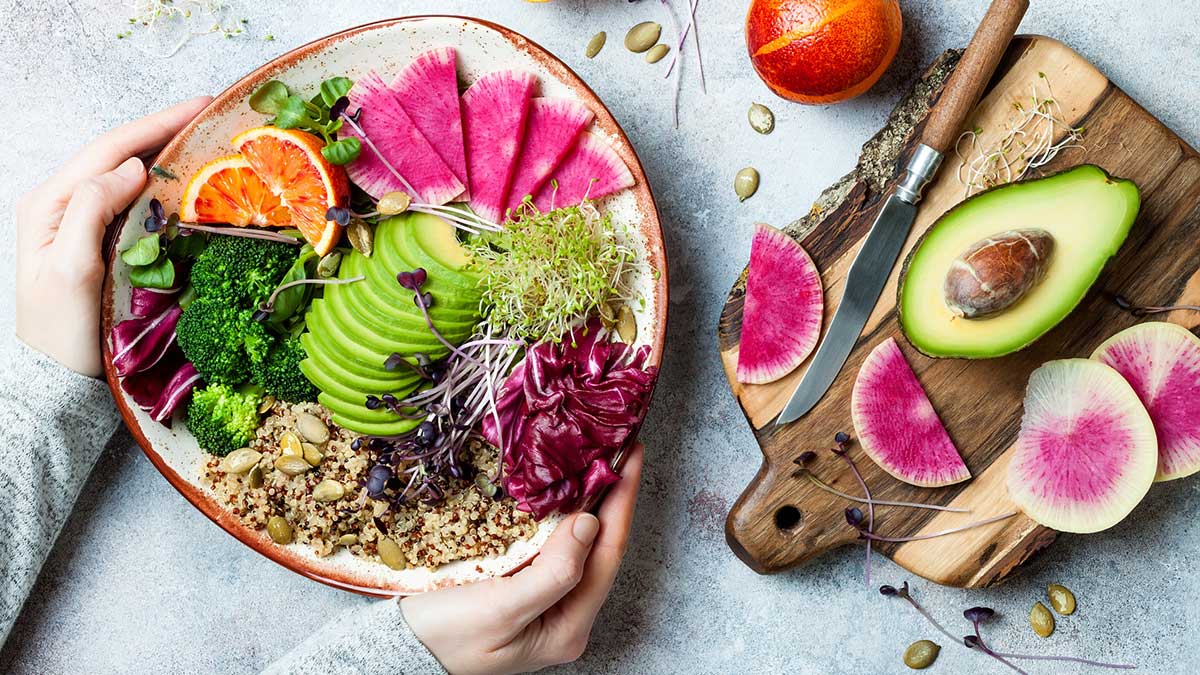Blog article
Can a healthy diet help with depression?

It’s well known that a healthy diet is good for our bodies. But could it also have a positive impact on our minds?
The connection between food, mental health and the brain – an emerging field of research called nutritional psychiatry – is a topic of increasing scientific interest.
One in seven Australians will experience depression in their lifetime, and one in four will experience an anxiety condition.1
While a healthy diet alone is not a cure, many studies around the world have found that nutritious food can play a role in supporting good mental health, says HBF dietitian Mary du Heaume.
“Diet plays a role in both the risk of developing depression and anxiety, and in managing these conditions,” she says.
“What we eat impacts many of the pathways and functions of our brain. It influences gut health, inflammation and oxidative stress, which in turn can impact our mental health.”
Depression and diet – what does the research show?
A major Australian study, the SMILES trial, was the first to demonstrate that healthy food could play a role in helping treat depression.2
“In this dietitian-led study, a Mediterranean-style diet rich in plant foods and healthy fats, combined with conventional care, resulted in significantly improved depression symptoms after 12 weeks,” du Heaume says.
Other research shows that eating foods high in fibre, such as wholegrains, fruits, vegetables and legumes may help reduce the risk of depression.3
“This is thought to be linked to lower blood glucose levels after eating, which helps with neural hormones regulating mood,” du Heaume explains.
There is also a growing body of evidence suggesting a link between mental health and gut health.4
“Research suggests our gut microbiota (gut bacteria and their associated environment) can influence our mood and behaviour,” du Heaume says. “Polyphenols and fibre found in plant foods can help support a healthy gut.”
What should you eat for good mental health?
It’s not quite as simple as providing a shopping list of specific mental health foods, du Heaume says.
“Research has shown that a focus on dietary balance and the eating patterns we create over time is most helpful, not individual foods and nutrients,” she explains. “And what we eat too much of is as important as what we do not eat enough of.”
To optimise your diet for mental health, du Heaume suggests a few healthy guidelines supported by research:
- Eat more fruits and vegetables. “Add vegetables or salad to both lunch and dinner, and make them half of whatever you eat,” du Heaume advises. “Fruit makes a great snack.” Choose a variety of different fruits and veggies too – du Heaume suggests aiming for 30 different plant foods each week.
- Focus on whole grains. Fibre-rich whole grains such as brown rice, whole-wheat bread, rye, oats, barley, buckwheat and quinoa give you a steady release of energy, helping to keep blood glucose stable.3
- Get your healthy fats. “A Mediterranean-style diet uses extra virgin olive oil, rich in healthy fats and polyphenols from the olive – use it as a dressing on your salads and to cook with,” du Heaume says. “A small handful of unsalted nuts each day can also provide a nutritious snack rich in healthy fats.” Oily fish such as salmon, tuna, sardines and mackerel are another good source of omega 3s, and du Heaume suggests eating these two to three times a week.
- Enjoy some plant-based meals. Legumes and pulses (such as chickpeas, lentils, kidney beans and split peas) can provide protein, fibre and B-group vitamins in a meatless meal.5
- Cut back on processed foods. “It’s best to limit foods that are highly processed and likely to contain refined carbohydrates, like white flour, sugar, saturated fat and less of the beneficial nutrients,” du Heaume advises.
Depression and healthy eating habits
Of course, living with depression can make it more challenging to create and stick to healthy eating routines.6
Some symptoms of depression can include loss of motivation, changes in appetite, and fatigue, which can all contribute to less healthy eating patterns.6
If you are struggling to make positive changes, du Heaume suggests a few strategies that might help:
- Start small. “Aim to add in an extra serve of fruit and vegetables each day or try to commit to cooking at least two to three times a week,” she says. “Changes can be small and incremental, but if you’re consistent they can have a positive influence over time.”
- Make use of home deliveries. “Take advantage of online shopping or try meal box deliveries,” du Heaume suggests. There are plenty of options available these days that can help make healthy cooking quick and convenient.
- Prepare extra meals in advance. When you cook a heathy meal, make extra and keep it in the freezer, so you always have some quick, nutritious options ready for days when it feels too hard.
- Keep the pantry stocked with healthy staples. “Stock up on things like canned vegetables and legumes – baked beans on wholegrain toast makes a simple, nutritious meal when you’re low on time, energy or motivation to cook.”
If you have a loved one struggling with mental health, du Heaume suggests keeping nutrition in mind when offering practical support.
“While the temptation is to provide a treat, consider helping them by providing extra fruit and vegetables or cook them some nutritious meals to eat or freeze,” she advises.
Why see a dietitian?
If you’re living with a mental health condition, you don’t have to manage it alone. Your mental health care team – which may include your GP, a psychologist and a psychiatrist – can help develop a management plan that works for you.7
To support this treatment, a dietitian can give you personalised dietary advice to help you optimise your food choices for mental health.8
“Diet works together with medical and psychological management,” du Heaume says.
“Seeing a dietitian can help you understand how your food choices may be influencing your mental health, and how to make changes to improve it.
“Your diet does not exist in isolation and understanding other factors that contribute to your food choices and habits can make it easier for you to eat well.”
How HBF can help with diet and mental health
HBF extras cover can pay benefits towards visits with:
- A psychologist or clinical psychologist, who can help you manage your mental health through evidence-based therapy.
- A dietitian, who can provide personalised dietary advice to help support your mental health and overall nutrition.
1Statistics, Beyond Blue
2BMC Medicine (2017)
3American Journal of Clinical Nutrition(2015)
4Clinic and Practice (2017)
5Legumes: what are they and how can I use them? Dietitians Australia
6Eating well, Beyond Blue
7Who can assist, Beyond Blue
8What dietitians do, Dietitians Australia
This article contains general information only and does not take into account the health, personal situation or needs of any person. In conjunction with your GP or treating health care professional, please consider whether the information is suitable for you and your personal circumstances.



